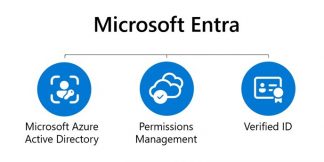Microsoft Entra
By Vasu Jakkal, Corporate Vice President, Microsoft Security, Compliance and Identity Marketing
What could the world achieve if we had trust in every digital experience and interaction?
This question has inspired us to think differently about identity and access, and today, we’re announcing our expanded vision for how we will help enable secure access for our connected world.
Microsoft Entrais our new product family that encompasses all of Microsoft’s identity and access capabilities. The Entra family includes Azure AD, as well as two new product categories: Cloud Infrastructure Entitlement Management (CIEM) and Decentralized Identity. The products in the Entra family will help provide secure access to everything for everyone, by providing identity and access management, cloud infrastructure entitlement management, and identity verification.
The need for trust in a hyperconnected world
Technology has transformed our lives in amazing ways. It’s reshaped how we interact with others, how we work, cultivate new skills, engage with brands, and take care of our health. It’s redefined how we do business, creating entirely new ways of serving existing needs while improving experience, quality, speed, and cost management.
Behind the scenes of all this innovation, millions and millions of connections happen every second between people, machines, apps, and devices so that they can share and access data. These interactions create exciting opportunities for how we engage with technology and with each other—but they also create an ever-expanding attack surface with more and more vulnerabilities for people and data that need to be addressed.
It’s become increasingly important—and challenging—for organizations to address these risks as they advance their digital initiatives. They need to remove barriers to innovation—without fear of being compromised. They need to instill trust, not only in their digital experiences and services, but in every digital interaction that powers them—every point of access between people, machines, microservices, and things.
Our expanded vision for identity and access
When the world was simpler, controlling digital access was relatively straightforward. It was just a matter of setting up the perimeter and letting only the right people in.
But that’s no longer sustainable. Organizations simply can’t put up gates around everything—their digital estates are growing, changing, and becoming boundaryless. It’s virtually impossible to anticipate and address the unlimited number of access scenarios that can occur across an organization and its supply chain, especially when it includes third-party systems, platforms, applications, and devices outside the organization’s control.
Identity is not just about directories, and access is not just about the network. Security challenges have become much broader, so we need broader solutions. We need to secure access for every customer, partner, and employee—and for every microservice, sensor, network, device, and database.
And doing this needs to be simple. Organizations don’t want to deal with incomplete and disjointed solutions that solve only one part of the problem, work in only a subset of environments, and require duct tape and bubble gum to work together. They need access decisions to be as granular as possible, and to automatically adapt based on real-time assessment of risk. And they need this everywhere: on-premises, Azure, Amazon Web Services, Google Cloud Platform, apps, websites, devices, all the above, and whatever comes next.
This is our expanded vision for identity and access, and we will deliver it with our new product family, Microsoft Entra.
Making the vision a reality: Identity as a trust fabric
To make this vision a reality, identity must evolve. Our interconnected world requires a flexible and agile model where people, organizations, apps, and even smart things could confidently make real-time access decisions. We need to build upon and expand our capabilities to support all the scenarios that our customers are facing.
Moving forward, we’re expanding our identity and access solutions so that they can serve as a trust fabric for the entire digital ecosystem—now and long into the future.
Microsoft Entra will verify all types of identities and secure, manage, and govern their access to any resource. The new Microsoft Entra product family will:
- Protect access to any app or resource for any user
- Secure and verify every identity across hybrid and multicloud environments
- Discover and govern permissions in multicloud environments
- Simplify the user experience with real-time intelligent access decisions
This is an important step towards delivering a comprehensive set of products for identity and access needs, and we’ll continue to expand the Microsoft Entra product family.
“Identity is one of the cornerstones of our cybersecurity for the future.”
—Thomas Mueller-Lynch, Service Owner Lead for Digital Identity, Siemens
Microsoft Azure Active Directory (AD), our hero identity and access management (IAM) product, will be part of the Microsoft Entra family, and all its capabilities that our customers know and love, such as Conditional Access and passwordless authentication, remain unchanged. Azure AD External Identities continues to be our identity solution for customers and partners under the Microsoft Entra family.
Additionally, we are adding new solutions announcing several product innovations as part of the Entra family.

Alt text: Solutions under the Microsoft Entra product family including Microsoft Azure AD, Permissions Management, and Verified ID
Reduce access risk across clouds
The adoption of multicloud has led to a massive increase in identities, permissions, and resources across public cloud platforms. Most identities are over-provisioned, expanding organizations’ attack surface and increasing the risk of accidental or malicious permission misuse. Without visibility across cloud providers, or tools that provide a consistent experience, it’s become incredibly challenging for identity and security teams to manage permissions and enforce the principle of least privilege across their entire digital estate.
With the acquisition of CloudKnox Security last year, we are now the first major cloud provider to offer a Cloud Infrastructure Entitlement Management (CIEM) solution: Microsoft Entra Permissions Management. It provides comprehensive visibility into permissions for all identities (both user and workload), actions, and resources across multicloud infrastructures. Permissions Management helps detect, right-size, and monitor unused and excessive permissions, and mitigates the risk of data breaches by enforcing the principle of least privilege in Microsoft Azure, Amazon Web Services, and Google Cloud Platform. Microsoft Entra Permissions Management will be a standalone offering generally available worldwide this July and will be integrated within the Defender for Cloud dashboard expanding Microsoft Defender for Cloud’s protection into CIEM.
Additionally, with the preview of workload identity management in Microsoft Entra, customers can assign and secure identities for any app or service hosted in Azure by extending the reach of access control and risk detection capabilities.
Enable secure digital interactions that respect privacy
At Microsoft, we deeply value, protect, and defend privacy, and nowhere is privacy more important than your personal identity. After several years working alongside the decentralized identity community, we’re proud to announce a new product offering: Microsoft Entra Verified ID, based on decentralized identity standards. Verified ID implements the industry standards that make portable, self-owned identity possible. It represents our commitment to an open, trustworthy, interoperable, and standards-based decentralized identity future for individuals and organizations. Instead of granting broad consent to countless apps and services and spreading identity data across numerous providers, Verified ID allows individuals and organizations to decide what information they share, when they share it, with whom they share it, and—when necessary—take it back.
The potential scenarios for decentralized identity are endless. When we can verify the credentials of an organization in less than a second, we can conduct business-to-business and business-to-customer transactions with greater efficiency and confidence. Conducting background checks becomes faster and more reliable when individuals can digitally store and share their education and certification credentials. Managing our health becomes less stressful when both doctor and patient can verify each other’s identity and trust that their interactions are private and secure. Microsoft Entra Verified ID will be generally available early August.
“We thought, ‘Wouldn’t it be fantastic to take a world-leading technology like Microsoft Entra and implement Verified ID for employees in our own office environment?’ We easily identified business opportunities where it would help us work more efficiently.”
—Chris Tate, Chief Executive Officer, Condatis
Automate critical Identity Governance scenarios
Next, let’s focus on Identity Governance for employees and partners. It’s an enormous challenge for IT and security teams to provision new users and guest accounts and manage their access rights manually. This can have a negative impact on both IT and individual productivity. New employees often experience a slow ramp up to full effectiveness while they wait for the access required for their jobs. Similar delays in granting necessary access to guest users undermine a smoothly functioning supply chain. Then, without formal or automated processes for reprovisioning or deactivating people’s accounts, their access rights may remain in place when they change roles or exit the organization.
Identity Governance addresses this with identity lifecycle management, which simplifies the processes for onboarding and offboarding users. Lifecycle workflows automate assigning and managing access rights, and monitoring and tracking access, as user attributes change. Lifecycle workflows in Identity Governance will enter public preview this July.
“We were so reactive for so long with old technology, it was a struggle. [With Azure AD Identity Governance] we’re finally able to be proactive, and we can field some of those complex requests from the business side of our organization.”
—Sally Harrison, Workplace Modernization Consultant, Mississippi Division of Medicaid
Create possibilities, not barriers
Microsoft Entra embodies our vision for what modern secure access should be. Identity should be an entryway into a world of new possibilities, not a blockade restricting access, creating friction, and holding back innovation. We want people to explore, to collaborate, to experiment—not because they are reckless, but because they are fearless.
Visit the Microsoft Entra website to learn more about how Azure AD, Microsoft Entra Permissions Management, and Microsoft Entra Verified ID deliver secure access for our connected world. Or, to learn more about Microsoft Security, visit our website, bookmark the Security blog, and follow us at @MSFTSecurity for the latest n
About the Author
 Vasu Jakkal, Corporate Vice President, Microsoft Security, Compliance and Identity Marketing
Vasu Jakkal, Corporate Vice President, Microsoft Security, Compliance and Identity Marketing
Vasu Jakkal is a passionate champion of building a better, safer, and more resilient world for all. She brings nearly 20 years of technology industry experience to Microsoft, where she is responsible for crafting the strategy, defining the go-to-market motions that help customers simplify and fortify their security posture, and guiding the execution of all aspects of SCI marketing. In her role, she also works closely with engineering to shape product strategy and roadmaps. Vasu is a dedicated advocate for diversity, and for expanding the opportunities for women in all fields of technology.
Vasu can be reached online at Twitter.com/VasuJakkal and at our company website http://www.mcirosoft.com
FAIR USE NOTICE: Under the “fair use” act, another author may make limited use of the original author’s work without asking permission. Pursuant to 17 U.S. Code § 107, certain uses of copyrighted material “for purposes such as criticism, comment, news reporting, teaching (including multiple copies for classroom use), scholarship, or research, is not an infringement of copyright.” As a matter of policy, fair use is based on the belief that the public is entitled to freely use portions of copyrighted materials for purposes of commentary and criticism. The fair use privilege is perhaps the most significant limitation on a copyright owner’s exclusive rights. Cyber Defense Media Group is a news reporting company, reporting cyber news, events, information and much more at no charge at our website Cyber Defense Magazine. All images and reporting are done exclusively under the Fair Use of the US copyright act.
Credit: Source link


Comments are closed.